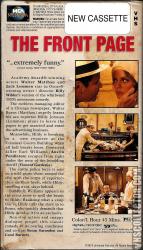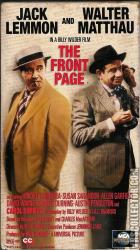The Front Page
Catalog Number
66036
-
Primary Distributor (If not listed, select "OTHER")
Catalog Number
66036
Primary Distributor (If not listed, select "OTHER")
Release Year
Country
N/A (NTSC)
N/A | N/A | N/A
N/A | N/A
The Front Page (1974)
Additional Information
Additional Information
It's the hottest story since the Chicago Fire... And they're sitting on it.
This third film version of the 1928 Ben Hecht/Charlie MacArthur Broadway hit The Front Page was the first one permitted to utilize all the salty profanities in the original play. Director Billy Wilder cast his two favorite leading men, Jack Lemmon and Walter Matthau, as ace reporter Hildy Johnson and ruthless newspaper editor Walter Burns, respectively. The plot of the Hecht/MacArthur play remains intact: Burns pulls every underhanded game in the book to prevent Johnson from leaving his Chicago paper to get married, and in so doing the two journalists uncover a cesspool of political corruption, centered around the planned execution of anarchist Earl Williams (Austin Pendleton). Carol Burnett has an extended cameo as Williams' tart girlfriend, Mollie Malloy. The Front Page was remade for a fourth time in 1988 as Switching Channels.
Chicago Examiner reporter Hildebrand "Hildy" Johnson (Jack Lemmon) has just quit his job in order to marry Peggy Grant (Susan Sarandon) and start a new career, when convict Earl Williams (Austin Pendleton) escapes from death row just prior to his execution. Earl is an impoverished, bumbling leftist whose only offense is stuffing fortune cookies with messages demanding the release of Sacco and Vanzetti, but the yellow press of Chicago has painted him as a dangerous threat from Moscow. As a result the citizenry are anxious to see him put to death.
Earl has not left the jail, and enters the prison pressroom while Hildy is alone there. Hildy cannot resist the lure of what could be the biggest scoop of his soon-to-be-over career. Ruthless, egomaniacal managing editor Walter Burns (Walter Matthau), desperate to keep Hildy on the job, encourages him to cover the story, frustrating Peggy, who is eager to catch their train. When Earl is in danger of being discovered, Mollie Malloy (Carol Burnett), a self-described "$2 whore from Division Street" who befriended Earl, creates a distraction by leaping from the third-floor window.
When Earl is caught, Hildy and Walter are arrested for aiding and abetting a fugitive, but are released when they discover that the mayor and sheriff colluded to conceal Earl's last-minute reprieve by the governor. Walter grudgingly accepts that he is losing his ace reporter and presents him with a watch as a token of his appreciation. Hildy and Peggy set off to get married, and Walter telegraphs the next railway station to alert them that the man who stole his watch is on the inbound train and should be apprehended by the police.
Vincent Canby of The New York Times thought the story was "a natural" for Wilder and Diamond, who "have a special (and, to my mind, very appealing) appreciation for vulgar, brilliant con artists of monumental tackiness." He continued, "Even though the mechanics and demands of movie-making slow what should be the furious tempo, this Front Page displays a giddy bitterness that is rare in any films except those of Mr. Wilder. It is also, much of the time, extremely funny." He described Walter Matthau and Austin Pendleton as "marvelous" and added, "Mr. Lemmon is comparatively reserved as the flamboyant Hildy, never quite letting go of his familiar comic personality to become dominated by the lunacies of the farce. He always remains a little outside it, acting. Carol Burnett has an even tougher time as Molly Malloy . . . This role may well be impossible, however, since it requires the actress to play for straight melodrama while everyone around her is going for laughs . . . Mr. Wilder has great fun with the period newspaper detail . . . and admires his various supporting actors to such an extent that he allows them to play as broadly as they could possibly desire." He concluded, "The hysteria is not as consistent as one might wish, nor, indeed, as epic as in Mr. Wilder's own One, Two, Three. The cohesive force is, instead, the director's fondness for frauds, which, I suspect, is really an admiration for people who barrel on through life completely intimidating those who should know better."[3]
The British television network Channel 4 called it the "least satisfying screen adaptation of Hecht and MacArthur's play," saying it "adds little to the mix other than a bit of choice language. The direction is depressingly flat and stagy, Wilder running on empty. While it is easy to see why he was attracted to this material . . . he just does not seem to have the energy here to do it justice. Matthau and Lemmon put in their usual faultless turns, but cannot lift a pervading air of pointlessness."[4]
TV Guide rated the film 2½ out of four stars and noted, "This slick remake of the ebullient original falls short of being the film it could have been, despite the presence of master filmmaker Wilder and his engaging costars . . . Despite the obvious charismatic interaction between Lemmon and Matthau, the film is oddly stilted. In an overly emphatic turn, the miscast Burnett easily gives the most awful performance of her career. She projects only one emotion - a gratingly annoying hysteria. One never enjoys the film so much as when her character throws herself out of a window."[5]
Burnett said in This Time Together that she was so displeased with her performance that when she was on an airplane where the film was shown, she apologized on the plane's intercom.[6]
The play again served as an inspiration for film makers with Switching Channels released in 1988.
Release Date: December 16, 1974
Distrib: Universal
Boxoffice: $15,000,000 2014: $64,525,000
This third film version of the 1928 Ben Hecht/Charlie MacArthur Broadway hit The Front Page was the first one permitted to utilize all the salty profanities in the original play. Director Billy Wilder cast his two favorite leading men, Jack Lemmon and Walter Matthau, as ace reporter Hildy Johnson and ruthless newspaper editor Walter Burns, respectively. The plot of the Hecht/MacArthur play remains intact: Burns pulls every underhanded game in the book to prevent Johnson from leaving his Chicago paper to get married, and in so doing the two journalists uncover a cesspool of political corruption, centered around the planned execution of anarchist Earl Williams (Austin Pendleton). Carol Burnett has an extended cameo as Williams' tart girlfriend, Mollie Malloy. The Front Page was remade for a fourth time in 1988 as Switching Channels.
Chicago Examiner reporter Hildebrand "Hildy" Johnson (Jack Lemmon) has just quit his job in order to marry Peggy Grant (Susan Sarandon) and start a new career, when convict Earl Williams (Austin Pendleton) escapes from death row just prior to his execution. Earl is an impoverished, bumbling leftist whose only offense is stuffing fortune cookies with messages demanding the release of Sacco and Vanzetti, but the yellow press of Chicago has painted him as a dangerous threat from Moscow. As a result the citizenry are anxious to see him put to death.
Earl has not left the jail, and enters the prison pressroom while Hildy is alone there. Hildy cannot resist the lure of what could be the biggest scoop of his soon-to-be-over career. Ruthless, egomaniacal managing editor Walter Burns (Walter Matthau), desperate to keep Hildy on the job, encourages him to cover the story, frustrating Peggy, who is eager to catch their train. When Earl is in danger of being discovered, Mollie Malloy (Carol Burnett), a self-described "$2 whore from Division Street" who befriended Earl, creates a distraction by leaping from the third-floor window.
When Earl is caught, Hildy and Walter are arrested for aiding and abetting a fugitive, but are released when they discover that the mayor and sheriff colluded to conceal Earl's last-minute reprieve by the governor. Walter grudgingly accepts that he is losing his ace reporter and presents him with a watch as a token of his appreciation. Hildy and Peggy set off to get married, and Walter telegraphs the next railway station to alert them that the man who stole his watch is on the inbound train and should be apprehended by the police.
Vincent Canby of The New York Times thought the story was "a natural" for Wilder and Diamond, who "have a special (and, to my mind, very appealing) appreciation for vulgar, brilliant con artists of monumental tackiness." He continued, "Even though the mechanics and demands of movie-making slow what should be the furious tempo, this Front Page displays a giddy bitterness that is rare in any films except those of Mr. Wilder. It is also, much of the time, extremely funny." He described Walter Matthau and Austin Pendleton as "marvelous" and added, "Mr. Lemmon is comparatively reserved as the flamboyant Hildy, never quite letting go of his familiar comic personality to become dominated by the lunacies of the farce. He always remains a little outside it, acting. Carol Burnett has an even tougher time as Molly Malloy . . . This role may well be impossible, however, since it requires the actress to play for straight melodrama while everyone around her is going for laughs . . . Mr. Wilder has great fun with the period newspaper detail . . . and admires his various supporting actors to such an extent that he allows them to play as broadly as they could possibly desire." He concluded, "The hysteria is not as consistent as one might wish, nor, indeed, as epic as in Mr. Wilder's own One, Two, Three. The cohesive force is, instead, the director's fondness for frauds, which, I suspect, is really an admiration for people who barrel on through life completely intimidating those who should know better."[3]
The British television network Channel 4 called it the "least satisfying screen adaptation of Hecht and MacArthur's play," saying it "adds little to the mix other than a bit of choice language. The direction is depressingly flat and stagy, Wilder running on empty. While it is easy to see why he was attracted to this material . . . he just does not seem to have the energy here to do it justice. Matthau and Lemmon put in their usual faultless turns, but cannot lift a pervading air of pointlessness."[4]
TV Guide rated the film 2½ out of four stars and noted, "This slick remake of the ebullient original falls short of being the film it could have been, despite the presence of master filmmaker Wilder and his engaging costars . . . Despite the obvious charismatic interaction between Lemmon and Matthau, the film is oddly stilted. In an overly emphatic turn, the miscast Burnett easily gives the most awful performance of her career. She projects only one emotion - a gratingly annoying hysteria. One never enjoys the film so much as when her character throws herself out of a window."[5]
Burnett said in This Time Together that she was so displeased with her performance that when she was on an airplane where the film was shown, she apologized on the plane's intercom.[6]
The play again served as an inspiration for film makers with Switching Channels released in 1988.
Release Date: December 16, 1974
Distrib: Universal
Boxoffice: $15,000,000 2014: $64,525,000






Comments0
Login / Register to post comments